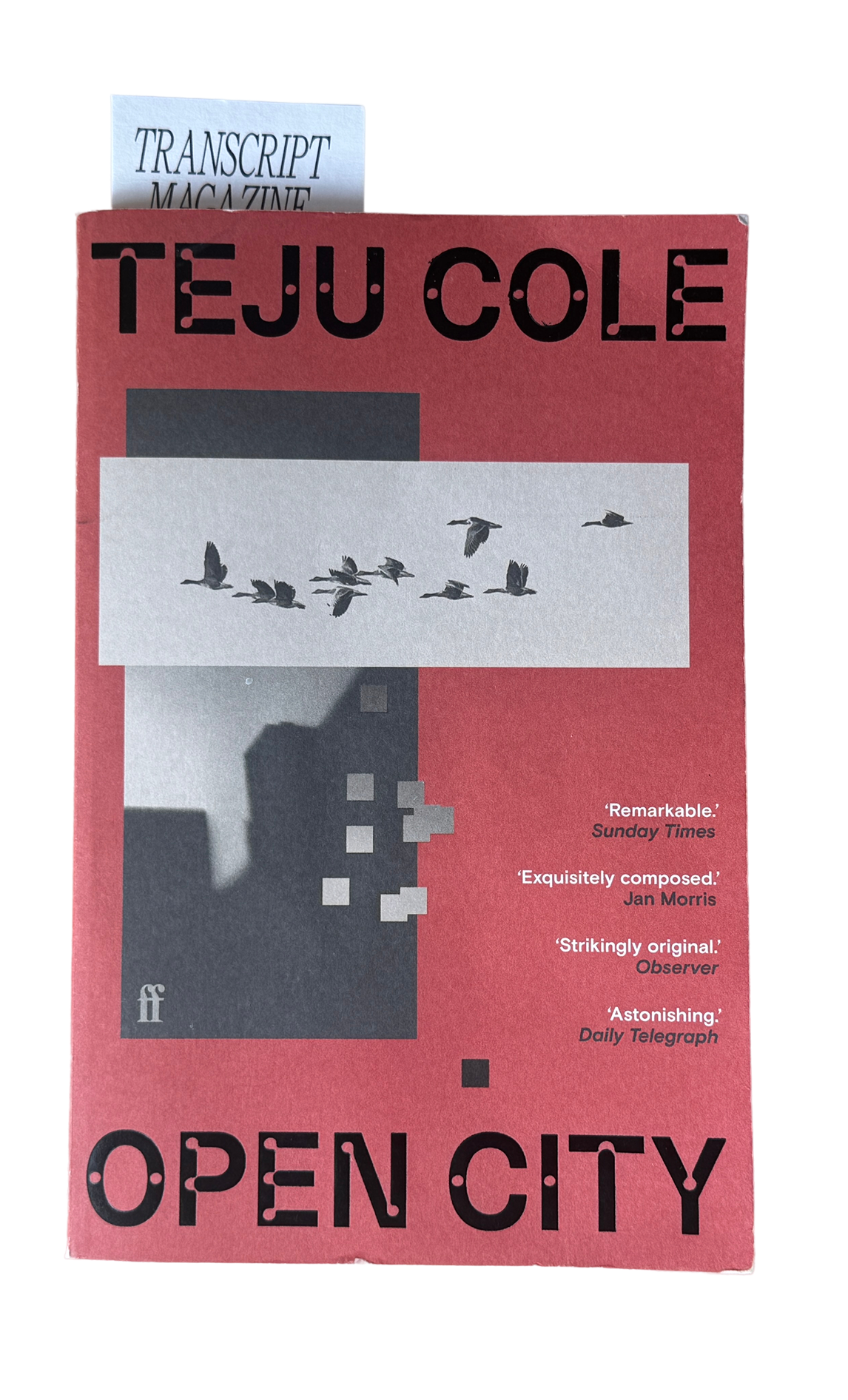Open City
by Teju Cole

Open City is a novel that reads like a great essay might, pulling in references to art, music, literature and history, weaving in facts and stories, building a collage that invites further discovery beyond its pages.
In the summer of 2022, my feet dangling in a pool of glistening water, located in the commune of Saint-Montan, I first read Teju Cole's Black Paper, a bundling of his essays. I haven't reread it in full since, but think of it often. One essay specifically, titled After Caravaggio, crosses my mind time and again.
After killing Ranuccio Tomassoni in 1606, Caravaggio—the prodigious, masterful painter and, then, murderer—fled south from Rome to Naples, Sicily and Malta. In 2016, Cole retraced his steps, visited and wrote about works of his—works he produced while on the run—and pitted the unsettling and violent paintings created in the 1600s against the reality of his (and our) own environment in 2016.

An art historian and photographer—for years, he penned the On Photography column for The New York Times—Cole's writing struck me as calm, and visual. Calming, even. He guides your gaze carefully, made me look at and feel the weight of these paintings, and their surroundings, in ways I can't recall experiencing often.
Reading Cole's essays opened the door to his novels. Open City, the first of his I've read, follows Julius, a doctor in New York in the final year of his psychiatry fellowship. He's estranged from his mother, his father passed away, his relationship recently ended. He wanders, spends his evenings taking long walks to balance his busy days at the hospital, often meandering for so long that he's forced to take a subway home.
Much like its protagonist, the novel roams, too. On the first page, already, we find a representative paragraph:
Not long before this aimless wandering began, I had fallen into the habit of watching bird migrations from my apartment, and I wonder now if the two are connected. On the days when I was home early enough from the hospital, I used to look out the window like someone taking auspices, hoping to see the miracle of natural immigration. Each time I caught sight of geese swooping in formation across the sky, I wondered how our life below might look from their perspective, and imagined that, were they ever to indulge in such speculation, the high-rises might seem to them like firs massed in a grove.
The book's form is diaristic, but never dull. There aren't major transformations, nor is there a real plot, and that's exactly what I appreciate about it. This is a walking novel: while reading, I felt like Cole took me along on a journey of discovery, as if strolling by Julius' side, following his gaze into New York alleyways or up at its skyscrapers; sitting down next to him at the places he frequents; listening in on his stimulating conversations, and picking up every fascinating little morsel he scatters on his path.
Julius—half-Nigerian, half-German—meets a wide range of people, many of whom are immigrants or emigrants. He briefly trades New York for Brussels, where he makes a half-hearted attempt to visit his grandma. There, he spends time with Farouq, a Moroccan student working at an internet café, who he finds intimidatingly intellectual. Farouq takes Julius to meet Khalil, they drink together, and they speak about politics and religion—about America, about Isreal. The conversations between the three of them are so lively and animated, I could very well imagine the other patrons' chatter fading away as Julius—captivated—learned about the lives and preoccupations of his new companions. Comprising the longest section of the book, his time spent in Brussels is my favourite.
Despite its lack of a clear narrative structure, Open City is a novel that reads like a great essay might, pulling in references to art, music, literature and history, weaving in facts and stories, building a collage that invites further discovery beyond its pages. His prose, rippling calmly like a park pond on a fall day, soothes me.
Sometimes he overdoes it, trying to fit in a few too many things, perhaps out of fear of delivering a novel that doesn't feel broad enough in scope. But, this is no such thing: while the book's universe is small, Julius' inner world easily holds the power to expand yours.
Thank you to Chantal, for gifting me Teju Cole's Black Paper, and Open City.
Open City by Teju Cole
Published by Faber & Faber in 2011
